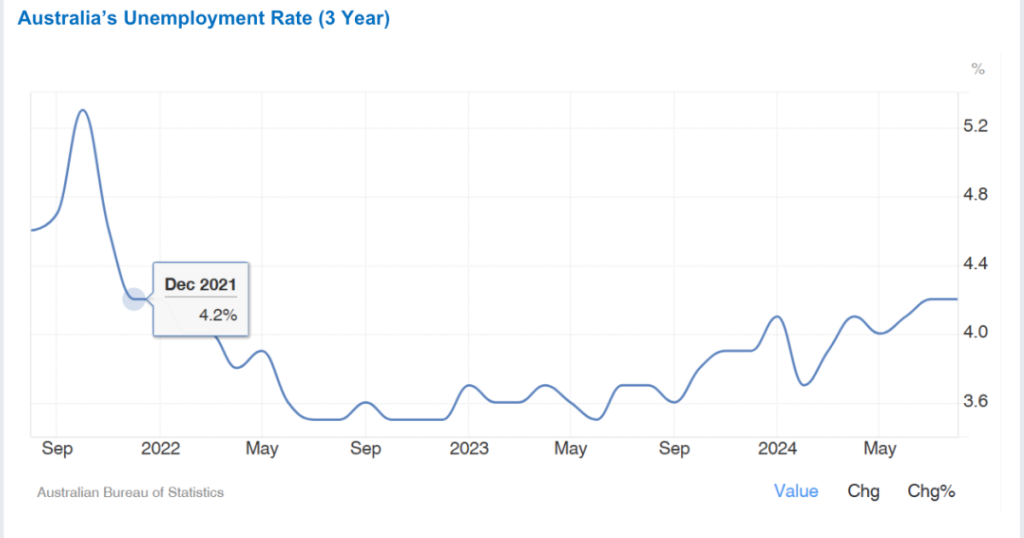How Refugees and Migrants Affect the Economy of Australia.
-
Agriculture
-
All Agriculture
Select sub classifications-
Agricultural Technician
-
Fisheries Officer
-
Meat Inspector
-
Quarantine Officer
-
Primary Products Inspector Nec
-
Aquaculture Farmer
-
Cotton Grower
-
Flower Grower
-
Fruit or Nut Grower
-
Grain, Oilseed or Pasture Grower
-
Grape Grower
-
Mixed Crop Farmer
-
Sugar Cane Grower
-
Turf Grower
-
Vegetable Grower
-
Crop Farmers nec
-
Apiarist
-
Beef Cattle Farmer
-
Dairy Cattle Farmer
-
Deer Farmer
-
Goat Farmer
-
Horse Breeder
-
Mixed Livestock Farmer
-
Pig Farmer
-
Poultry Farmer
-
Sheep Farmer
-
Livestock Farmer nec
-
Mixed Crop and Livestock Farmer
-
Hunter Trapper
-
Pest Controller
-
Farm, Forestry and Garden Workers Nec
-
Wine Maker
-
Food Technologist
-
Agricultural Engineer
-
Agriculture Consultant
-
Forester
-
Biomedical Engineer
-
Production Manager (Forestry)
-
Shearer
-
Veterinary Nurse
-
Wool Buyer
-
Florist
-
Gardener (General)
-
Arborist
-
Landscape Gardener
-
Greenkeeper
-
Nurseryperson
-
Dog Trainer or Handler
-
Horse Trainer
-
Pet Groomer
-
Zookeeper
-
Animal Attendants and Trainers (nec)
-
Agricultural and Horticultural Mobile Plant Operator
-
Logging Plant Operator
-
Conservation Officer
-
Environmental Consultant
-
Environmental Research Scientist
-
Park Ranger
-
Environmental Scientists (nec)
-
Automotive Heavy Mechanic (Agricultural)
-
-
Automotive
-
All Automotive
Select sub classifications-
Automotive Electrician
-
Motor Vehicle Parts and Accessories Fitter
-
Motor Vehicle or Caravan Salesperson
-
Panelbeater
-
Motor Vehicle Parts Interpreter
-
Vehicle Body Builder
-
Vehicle Trimmer
-
Vehicle Painter
-
Motor Mechanic (General)
-
Diesel Motor Mechanic
-
Motorcycle Mechanic
-
Small Engine Mechanic
-
Workshop/Service Centre Manager
-
Workshop Manager/Leading Hand
-
Fleet Manager
-
Railway Station Manager
-
Transport Company Manager
-
Others
-
-
Engineering
-
All Engineering
Select sub classifications-
Engineering Manager
-
Chemical Engineer
-
Materials Engineer
-
Civil Engineer
-
Geotechnical Engineer
-
Quantity Surveyor
-
Structural Engineer
-
Transport Engineer
-
Electrical Engineer
-
Electronics Engineer
-
Industrial Engineer
-
Mechanical Engineer
-
Production or Plant Engineer
-
Mining Engineer (excluding Petroleum)
-
Petroleum engineer
-
Aeronautical Engineer
-
Agricultural Engineer
-
Biomedical Engineer
-
Engineering Technologist
-
Environmental Engineer
-
Naval Architect
-
Engineering Professionals (nec)
-
Telecommunications Engineer
-
Telecommunications Network Engineer
-
Civil Engineering Technician
-
Civil Engineering Draftsperson
-
Electrical Engineering Technician
-
Electrical Engineering Draftsperson
-
Electronic Engineering Technician
-
Electronic Engineering Draftsperson
-
Mechanical Engineering Technician
-
Mechanical Engineering Draftsperson
-
Telecommunications Field Engineer
-
Telecommunications Network Planner
-
Telecommunications Technical Officer or Technologist
-
Architectural Draftsperson
-
Building Associate
-
Building Inspector
-
Construction Estimator
-
Plumbing Inspector
-
Surveying or Spatial Science Technician
-
Architectural, Building & Surveying Technicians (nec)
-
Safety Inspector
-
Maintenance Planner
-
Metallurgical or Materials Technician
-
Mine Deputy
-
Building and Engineering Technicians nec
-
Aeroplane Pilot
-
Air Traffic Controller
-
Flying Instructor
-
Helicopter Pilot
-
Air Transport Professionals nec
-
Master Fisher
-
Ship's Engineer
-
Ship's Master
-
Ship's Officer
-
Ship's Surveyor
-
Marine Transport Professionals nec
-
Architect
-
Landscape Architect
-
Surveyor
-
Cartographer
-
Other Spatial Scientist
-
Industrial Designer
-
Urban and Regional Planner
-
Software Engineer
-
Computer Network & Systems Engineer
-
ICT Quality Assurance Engineer
-
ICT Support Engineer
-
ICT Systems Test Engineer
-
ICT Support and Test Engineers (nec)
-
Aircraft Maintenance Engineer (Avionics)
-
Aircraft Maintenance Engineer (Mechanical)
-
Aircraft Maintenance Engineer (Structures)
-
Others
-
-
Healthcare & Medical
-
All Healthcare & Medical
Select sub classifications-
Registered Nurse (Aged Care)
-
Registered Nurse (Child & Family Health)
-
Registered Nurse (Community Health)
-
Registered Nurse (Critical Care & Emergency)
-
Registered Nurse (Developmental Disability)
-
Registered Nurse (Disability & Rehabilitation)
-
Registered Nurse (Medical)
-
Registered Nurse (Medical Practice)
-
Registered Nurse (Mental Health)
-
Registered Nurse (Perioperative)
-
Registered Nurse (Surgical)
-
Registered Nurse (Paediatrics)
-
Registered Nurses (nec)
-
MIDWIFE
-
Nurse Practitioner
-
General Practitioner
-
Resident Medical Officer
-
Anaesthetist
-
Specialist Physician (General Medicine)
-
Cardiologist
-
Clinical Haematologist
-
Medical Oncologist
-
Endocrinologist
-
Gastroenterologist
-
Intensive Care Specialist
-
Neurologist
-
Paediatrician
-
Renal Medicine Specialist
-
Rheumatologist
-
Thoracic Medicine Specialist
-
Specialist Physicians nec
-
Psychiatrist
-
Surgeon (General)
-
Cardiothoracic Surgeon
-
Neurosurgeon
-
Orthopaedic Surgeon
-
Otorhinolaryngologist
-
Paediatric Surgeon
-
Plastic and Reconstructive Surgeon
-
Urologist
-
Vascular Surgeon
-
Dermatologist
-
Emergency Medicine Specialist
-
Obstetrician and Gynaecologist
-
Ophthalmologist
-
Pathologist
-
Diagnostic and Interventional Radiologist
-
Radiation Oncologist
-
Medical Practitioners nec
-
Medical Diagnostic Radiographer
-
Medical Radiation Therapist
-
Nuclear Medicine Technologist
-
Sonographer
-
Optometrist
-
ORTHOPTIST
-
Dietitians
-
Environmental Health Officer
-
Occupational Health and Safety Adviser
-
Hospital Pharmacist
-
Industrial Pharmacist
-
Retail Pharmacist
-
Health Promotion Officer
-
Orthotist or Prosthetist
-
Health Diagnostic and Promotion Professionals nec
-
Chiropractors
-
Osteopaths
-
Acupuncturist
-
Homeopath
-
Naturopath
-
Traditional Chinese Medicine Practitioner
-
Complementary Health Therapist nec
-
Dental Specialist
-
Dentist
-
Occupational Therapist
-
Physiotherapist
-
Podiatrist
-
Audiologist
-
Speech Pathologist
-
Nurse Educator
-
Nurse Researcher
-
Nurse Manager
-
Medical Administrator
-
Nursing Clinical Director
-
Primary Health Organisation Manager
-
Welfare Centre Manager
-
Health And Welfare Services Managers (nec)
-
Enrolled Nurse
-
Mothercraft Nurse
-
Ambulance Officer
-
Intensive Care Ambulance Paramedic
-
Dental Hygienist
-
Dental Prosthetist
-
Dental Technician
-
Dental Therapist
-
Diversional Therapist
-
Aboriginal and Torres Strait Island Health Worker
-
Massage Therapist
-
Community Worker
-
Disabilities Services Officer
-
Family Support Worker
-
Parole or Probation Officer
-
Residential Care Officer
-
Youth Worker
-
Anaesthetic Technician
-
Cardiac Technician
-
Medical Laboratory Technician
-
Operating Theatre Technician
-
PHARMACY TECHNICIAN
-
Pathology Collector
-
Medical Technicians (nec)
-
Other
-
-
IT
-
All IT
Select sub classifications-
Chief Information Officer
-
ICT Project Manager***
-
ICT Managers (nec)
-
ICT Trainer
-
ICT Business Analyst
-
Systems Analyst
-
Multimedia Specialist
-
Web Developer***
-
Analyst Programmer
-
Developer / Programmer
-
Software Engineer
-
Software Tester
-
Software & Applications Programmers (nec)
-
Database Administrator
-
ICT Security Specialist
-
Systems Administrator
-
Computer Network & Systems Engineer
-
Network Administrator
-
Network Analyst
-
ICT Quality Assurance Engineer
-
ICT Support Engineer
-
ICT Systems Test Engineer
-
ICT Support and Test Engineers (nec)
-
Web Administrator
-
ICT Account Manager
-
ICT Business Development Manager
-
ICT Sales Representative
-
Multimedia Designer
-
Graphic Designer
-
Illustrator
-
Web Designer
-
Other
-
-
Scientific
-
All Scientific
Select sub classifications-
Conservation Officer
-
Environmental Consultant
-
Environmental Research Scientist
-
Park Ranger
-
Environmental Scientists (nec)
-
Anatomist or Physiologist
-
Biochemist
-
Biotechnologist
-
Botanist
-
Marine Biologist
-
Microbiologist
-
Zoologist
-
Life scientists (nec)
-
Life scientist (General)
-
Chemistry Technician
-
Earth Science Technician
-
Life Science Technician
-
School Laboratory Technician
-
Science Technicians (nec)
-
Medical Laboratory Scientist
-
Chemist
-
Food Technologist
-
Wine Maker
-
Geologist
-
Geophysicist
-
Agriculture Scientist
-
Chemical Engineer
-
Laboratory Manager
-
Natural and Physical Science Professionals nec
-
Nutritionist
-
Pathology Collector
-
Quality Assurance Manager
-
Sales Representative - Medical and Pharmaceutical
-
Veterinarian
-
Others
-
Hospital Pharmacist
-
Industrial Pharmacist
-
Retail Pharmacist
-
-
Trade
-
All Trade
Select sub classifications-
Airconditioning and Mechanical Services Plumber
-
Airconditioning and Refrigeration Mechanic
-
Aircraft Maintenance Engineer (Avionics)
-
Aircraft Maintenance Engineer (Mechanical)
-
Aircraft Maintenance Engineer (Structures)
-
Apparel Cutter
-
Baker
-
Pastrycook
-
Blacksmith
-
Boat Builder and Repairer
-
Bricklayer
-
Broadcast Transmitter Operator
-
Business Machine Mechanic
-
Butchers and Smallgoods Maker
-
Cabinetmaker
-
Cabler (Data and Telecommunications)
-
Camera Operator (Film, Television or Video)
-
Canvas Goods Fabricator
-
Carpenter
-
Carpenter and Joiner
-
Chef
-
Chemical Plant Operator
-
Clothing Trades Worker (nec)
-
Clothing Patternmaker
-
Communications Operator
-
Cook
-
Drainer
-
Dressmaker or Tailor
-
Electrical Linesworker
-
Electrician (General)
-
Electrician (Special Class)
-
Electronic Equipment Trades Worker
-
Electronic Instrument Trades Worker (General)
-
Electronic Instrument Trades Worker (Special Class)
-
Electroplater
-
Engineering Patternmaker
-
Engraver
-
Farrier
-
Fibrous Plasterer
-
Fire Protection Equipment Technician
-
Fitter (General)
-
Fitter and Turner
-
Fitter-Welder
-
Floor Finisher
-
Furniture Finisher
-
Gallery or Museum Technician
-
Gas or Petroleum Operator
-
Gasfitter
-
Glazier
-
Graphic Pre-press Trades Worker
-
Gunsmith
-
Hairdresser
-
Jeweller
-
Joiner
-
Leather Goods Maker
-
Lift Mechanic
-
Light Technician
-
Locksmith
-
Make up Artist
-
Metal Casting Trades Worker
-
Metal Fabricator
-
Metal Fitters and Machinists nec
-
Metal Machinist (First Class)
-
Metal Polisher
-
Musical Instrument Maker or Repairer
-
Optical Dispenser
-
Optical Mechanic
-
Painting Trades Workers
-
Pastry cook
-
Performing Arts Technician (nec)
-
Picture Framer
-
Plastics Technician
-
Plumber (General)
-
Power Generation Plant Operator
-
Precision Instrument Maker and Repairer
-
Pressure Welder
-
Print Finisher
-
Printing Machinist
-
Roof Plumber
-
Roof Tiler
-
Sail Maker
-
Saw Maker and Repairer
-
Screen Printer
-
Sheetmetal Trades Worker
-
Shipwright
-
Shoemaker
-
Signwriter
-
Small Offset Printer
-
Solid Plasterer
-
Sound Technician
-
Stonemason
-
Technical Cable Jointer
-
Technicians and Trades Workers nec
-
Telecommunications Cable Jointer
-
Telecommunications Linesworker
-
Telecommunications Technician
-
Television Equipment Operator
-
Textile, Clothing and Footwear Mechanic
-
Toolmaker
-
Upholsterer
-
Wall and Floor Tiler
-
Watch and Clock Maker and Repairer
-
Welder (First Class)
-
Wood Machinist
-
Wood Machinists and Other Wood Trades Workers nec
-
Wood Turner
-
Fashion Designer
-
Jewellery Designer
-
Interior Designer
-
Other
-
REFINE RESULTS

Migrants and refugees are frequently employed in a wide range of industries, including both skilled and unskilled jobs that are essential for the economy.
In a world where international mobility continues to shape the world increasingly, the story of refugees and migrants is frequently distorted by political discussion and riddled with false information. But under the surface of these discussions is a story that is not as popular but no less significant: the significant economic contributions made by migrants and refugees. Their impact on the economic structure of host nations is significant and varied, ranging from stimulating innovation to rejuvenating aged workers.
Refueling the Workforce
Refugees and migrants often fill critical gaps in the labor market, particularly in industries facing labor shortages. Their willingness to take on various roles, from skilled positions to essential yet less desired jobs, helps sustain key sectors like healthcare, agriculture, and technology, ensuring these industries continue to thrive and support the economy.
Boosting Entrepreneurship and Innovation
Many refugees and migrants possess a unique entrepreneurial spirit, driven by the necessity to adapt and the desire to succeed in their new homes. They establish businesses at higher rates than native-born citizens, not only creating jobs but also introducing innovative products and services that can lead to new markets and economic niches.
Enriching Consumer Markets
The diverse cultural backgrounds of refugees and migrants broaden consumer markets. They introduce new products and services that cater to a variety of tastes and needs, thus expanding market opportunities for local businesses. This diversity in consumer choice strengthens the economic resilience of communities.
Fiscal Contributions
Contrary to popular belief, refugees and migrants contribute significantly to public finances. They pay taxes and contribute to social security systems, often more than they receive in benefits. Over time, their fiscal input helps in sustaining public services and infrastructure.
Filling Demographic Gaps
In countries facing demographic challenges like aging populations and low birth rates, refugees and migrants help balance the demographic scales. They are generally younger and have higher fertility rates, which helps in maintaining a balanced age structure necessary for economic stability and growth.
Spurring Cultural Exchange and Global Connections
Refugees and migrants bring unique cultural perspectives that enrich the social fabric of host countries. This cultural exchange fosters global connections and understanding, paving the way for international collaborations and business opportunities.
Enhancing Labor Market Flexibility
The diverse skill sets and adaptability of refugees and migrants contribute to a more flexible labor market. They can move between roles and sectors as needed, helping economies to adapt to changing market demands and technological advancements.
Challenges and Opportunities
While the economic contributions of refugees and migrants are significant, challenges such as integration barriers, language proficiency, and recognition of foreign qualifications can hinder their full economic potential. Addressing these challenges not only benefits refugees and migrants but also enhances the overall economic prosperity of host countries.
The narrative surrounding refugees and migrants is complex and often overshadowed by political rhetoric. However, their economic contributions are undeniable and essential to the growth and sustainability of host economies. Recognising and supporting the integration of refugees and migrants is not just a humanitarian gesture but a strategic economic decision.
At Konnecting, we understand the profound impact that skilled migrants and refugees can have on the Australian economy and beyond. Their skills, resilience, and entrepreneurial spirit are invaluable assets that enrich our communities and industries. Whether you’re looking to migrate and contribute your skills, or you’re an employer seeking to diversify your workforce, we’re here to make those connections happen.
Reach out to Konnecting today, and let’s take the first step towards a brighter, more inclusive future.
Related News
Navigating Australia’s Reliance on Foreign Students: Three Compelling Reasons Why Breaking Free Is Challenging
Navigating Australia’s Reliance on Foreign Students: Three Compelling Reasons Why Breaking Free Is Challenging The Crikey article titled “Can we curb our reliance on foreign students? Here are three reasons why not” explores the challenges and consequences Australia faces due to its heavy dependence on foreign students. The article discusses three key areas affected by this…
How Talking About Your Feelings Can Boost Your Career After Moving to Australia
Migrating to Australia will be both exhilarating and challenging. From navigating the Australian visa process to finding a job in a new cultural environment, many international migrants find that emotional resilience and self-awareness are key to building a successful career in Australia. Let’s explore how discussing and understanding your feelings with guidance from experts like…
Australia’s Economic Conundrum: Balancing Recession Risks with Pervasive Labour Shortages
Australia is currently navigating a complex economic landscape, marked by recent decades record high interest rates and significant labour shortages across multiple sectors. This dual challenge requires a strategic response from policymakers, businesses, and industry stakeholders. Economic Uncertainty and Recession Risks Mark Bouris, a respected Australian entrepreneur, had voiced concerns about the potential for a…




